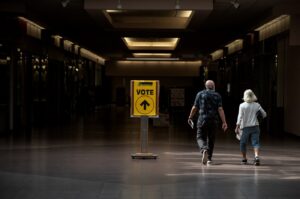Fact File: Will citizenship markers on Alberta ID stop non-citizens from voting?
By Canadian Press on September 23, 2025.
Last week, the government of Alberta said it plans to add mandatory citizenship markers to driver’s licences and other forms of identification. Premier Danielle Smith said the move would “ensure that only eligible citizens cast ballots.”
Social media posts reacting to the change claimed it could help stop illegal voting by non-citizens in elections.
However, a driver’s licence or provincial ID is not required to vote in federal or Alberta provincial elections, and both Elections Canada and Elections Alberta have reported few incidents of ineligible voting.
THE CLAIM
Last week, the government of Alberta announced it plans to add mandatory
citizenship markers to driver’s licences and other forms of ID, making it the first province in Canada to do so.
Smith told reporters the change would streamline access to provincial services like student aid and health benefits and prevent election fraud.
On social media, some users pointed to how the change could stop federal election fraud by preventing non-citizens from voting.
“We need this everywhere so non citizens can’t vote and rig our elections,” a commenter wrote on
Instagram.
In an
Instagram video, one user claimed that because people can vote with a driver’s licence in federal elections, mandatory citizenship markers on those licences “ensures (non-citizens) cannot vote.”
THE FACTS
Only Canadian citizens over the age of 18 can vote in Canada’s
federal elections and Alberta’s
provincial elections. Alberta electors must reside in Alberta.
It is illegal for non-citizens to vote in Canadian elections.
While a driver’s licence is one form of acceptable identification, it’s not required to vote. In both
federal and Alberta’s
provincial elections, electors can show one piece of government-issued photo ID with a person’s name, address and photo, or two pieces of ID if both contain the elector’s name and at least one shows their current address.
Voters can show their driver’s licence or provincial ID card as their one piece of ID. But they may also show two pieces of ID, such as a passport and a bank statement.
Electors without ID can also have another elector vouch for them. Both provincially and federally, the elector must live in the same voting area and be able to prove their identity and address. Federal electors without ID must declare their identity and address in writing and in Alberta, the voucher must sign a declaration stating they know the elector.
HOW MANY NON-CITIZENS VOTE IN CANADA’S ELECTIONS?
Elections Alberta issued three
letters of reprimand since the 2023 provincial election related to ineligible voters.
In 2024 and 2025, the Commissioner of Canada Elections
imposed fines between $1,000 and $1,250 on three people who voted in the 2021 federal election as non-citizens.
In a response on the
X platform, formerly Twitter, Elections Canada said electors must sign a written affirmation stating they meet voting requirements, and prove their identity and address.
The agency said it compares data from Immigration, Refugees and Citizenship Canada with its National Register of Electors, which is the database of Canadians eligible to vote in federal elections.
“We remove the names of those confirmed to be non-citizens,” Elections Canada said.
On its website, the agency
noted “voting by non-citizens is rare and has not been used as part of a co-ordinated plan to disrupt federal elections.”
It pointed to its voter registration and identification
safeguards like assigned polling stations, postelection verification checks and updates to the national register of electors as methods that ensure only those who are eligible to vote take part in elections.
This report by The Canadian Press was first published
Sept. 23, 2025.
Marissa Birnie, The Canadian Press
28
-27





